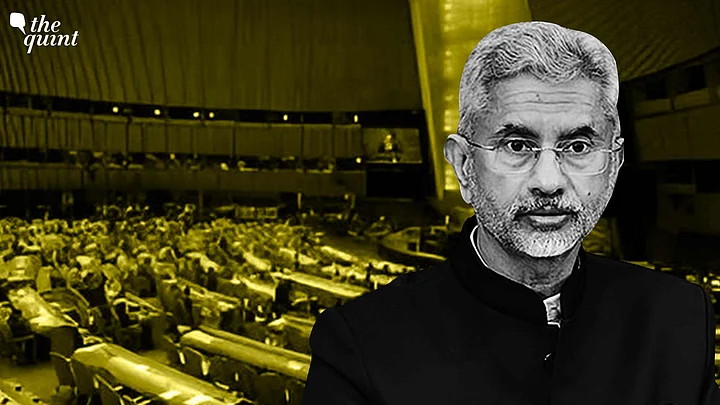The Ukrainian war was fought at the diplomatic – and one can say, 'hardly diplomatic!' level at the 77th session of the United Nations General Assembly(UNGA) this week. US President Joe Biden invoked the UN Charter to condemn Russian President Vladimir Putin’s war in Ukraine, and Ukrainian President Volodymyr Zelenskyy wanted Russia to be punished for invading his country, and called it a “terrorist state”, and made it clear that Ukraine would fight the war all the way to the end even as Putin announced the reinforcement of 300,000 reservists to go to the war front.
African Union leader Macky Sall made it clear that Africa does not want to be “the breeding ground” of a new Cold War and it cannot be pressured into taking sides over the Ukraine war, even as he pressed for the need for the United Nations to give representation to Africa on the Security Council through two seats.
UNGA Turned Into a Global Political Slugfest
Naturally, there were other slugfests at the UNGA, mainly that of Iranian President Ebrahim Raisi, when he railed against the United States and demanded that former American President Donald Trump be put on trial for the assassination of Iranian Islamic Revolutionary Guard Corps chief Qasem Soleimani by the Americans in Baghdad in January 2020. And there was Turkish President Recep Tayyip Erdogan, talking about human rights violations in Kashmir, which raised India’s hackles, and it was felt that Prime Minister Narendra Modi’s meeting with Erdogan at the Shanghai Cooperation Organisation (SCO) in Samarkand last week has sort of made Erdogan “mellower”.
The India-Pakistan battle of words over Kashmir remains to be re-enacted for the umpteenth time at the UNGA. Pakistan feels that it has nothing else to talk about if it does raise the Kashmir issue, and India, tired and bored, fields a young diplomat to deliver the counter-attack.
Meanwhile, UN Secretary-General António Guterres made a passionate and eloquent plea for the countries of the world, especially the rich ones, to tackle the challenges of global hunger in the wake of Covid and of climate change. But his plea got drowned in the crossfire of international politics.
India Without Modi at UNGA Pulled a Lesser Act
Prime Minister Modi did not choose to attend the UNGA this year and External Affairs Minister Subramaniam Jaishankar is heading the Indian delegation, and he is engaged in making new connections. For example, the India-France-United Arab Emirates formation, is one of the many trilateral set-ups, even as the world is teeming with scores of idelogical alliances across continents.
With the absence of Mr Modi, it seems India chose to be the invisible actor, as Mr Jaishankar made his way through the international circle as it were. Mr Modi’s friendly counsel to Mr Putin at Samarkand that this is not 'the era for war' echoed at UNGA with French President Emmanuel Macron loudly affirming it, but India has chosen to remain quiet on the Ukraine issue even as it wants both sides to get down to talks, which Ukraine and Russia are not prepared to commit to.
The UNGA is seen by many Indian strategic experts as just a 'talking club' and nothing more, and the eyes are set on India’s getting the permanent member slot at the Security Council.
Un Reforms Stand Sidelined
Though India’s top representatives make a ritualistic reference to it time and again, from Prime Minister Modi onward, there is no perceptible move on UN reforms, nor that of the International Monetary Fund (IMF) and the World Bank (WB).
It seems India is biding its time even as it moves up the ranks of the largest economies, now the fourth largest after the US, China, Germany and old colonizer, Britain. And India is gathering friends and allies as it waits to push for the UN reforms.
India Lowers Its Pitch for Hunger Crisis, Vaccines
Mr Jaishankar’s address to the UNGA was in low key, reiterating for the umpteenth time, the need for UN reforms, and a hint at how India should find its rightful place at the much-exaggerated power centre of the UN system, the Security Council.
In his press interaction with the Indian media on Saturday, he struck a more modest note. He thought it would be presumptuous to believe that India will get the veto right like the original permanent members of the UNSC. India’s membership in the ‘horse-shoe’ forum then would remain ornamental then.
Facing problems of agricultural production itself due to the vagaries of monsoon, India is not in position to make any meaningful statement on the crisis of global hunger which has emerged as a burning issue.
The earlier statements of India becoming the 'Granary of world' and even the 'Pharmacy of the world' (in the Covid vaccine year of 2021) had to take a backseat for internal and external reasons.
What Can Make India a Global Influencer?
It can be said that it is not always necessary to make statements that set the world agenda, that there is a time to be vocal and a time to remain silent, which could very well be true. India is exploring the many opportunities that seem to be opening up in a fluid global situation where the power equations and the balance of power are shifting rapidly like the current of a fast-flowing river.
India is assessing the possibilities of being in the forefront of a global influencer. India is respected and liked, and yes Mr Modi has established himself as the friendly leader from India, but the world is caught up in its own conflicts and challenges. India has nothing much to say about them.
(The writer is a New Delhi-based journalist. He tweets @ParsaJr. This is an opinion piece and the views expressed above are the author’s own. The Quint neither endorses nor is responsible for the same.)
(At The Quint, we question everything. Play an active role in shaping our journalism by becoming a member today.)
